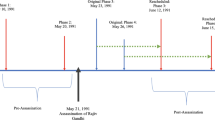Abstract
This paper addresses the relationship between changes in issue preferences and changes in partisanship, and examines the possibility that different types of issues may be associated with different dimensions of partisanship. A discriminant function analysis using the 1972–74–76 CPS Panel reveals that Democrats, Independents, and Republicans are very different from one another in terms of partisan issue preferences on a New Deal and a racial issue. The association between issue preferences and changes in strength among partisans is less stable, but the Democratic identification seems to be more closely aligned with the New Deal and racial issues than the Republican identification. Leaners appear to be more partisan in their issue preferences than weak identifiers are.
Similar content being viewed by others
References
Andersen, Kristi (1979).The Creation of a Democratic Majority. Chicago: University of Chicago Press.
Brody, Richard A., and Rothenberg, Lawrence S. (1988). The instability of partisanship: An analysis of the 1980 presidential election.British Journal of Political Science 18: 445–466.
Campbell, Angus, Converse, Philip E., Miller, Warren E., and Stokes, Donald E. (1960).The American Voter. New York: John Wiley and Sons.
Carmines, Edward G., Renten, Steven H., and Stimson, James A. (1984). Events and alignments: The party image link. In Richard G. Niemi and Herbert F. Weisberg (eds.),Controversies in Voting Behavior, 2nd ed. Washington: Congressional Quarterly Press.
Carmines, Edward G., and Stimson, James A. (1984). The dynamics of issue evolution. In Russell J. Dalton, Scott C. Flanagan, and Paul Allen Beck (eds.),Electoral Change in Advanced Industrial Democracies: Realignment or Dealignment? Princeton, NJ: Princeton University Press.
Carmines, Edward G., and Stimson, James A. (1986). On the structure and sequence of issue evolution.American Political Science Review 80: 901–920.
Converse, Philip E. (1964). The nature of belief systems in mass publics. In David Apter (ed.),Ideology and Discontent. New York: Free Press.
Converse, Philip E., and Markus, Gregory B. (1979). ‘Plus a change’: The New CPS Election Study Panel.American Political Science Review 73: 2–49.
Dennis, Jack (1982). New measures of partisanship in models of voting. Paper presented at the annual meetings of the Midwest Political Science Association, Milwaukee.
Dobson, Douglas, and Meeter, Duane A. (1974). Alternative Markov models for describing change in party identification.American Journal of Political Science 18: 487–500.
Dobson, Douglas, and St. Angelo, Douglas (1975). Party identification and the floating vote: Some dynamics.American Political Science Review 69: 481–490.
Dreyer, Edward C. (1973). Change and stability in party identification.Journal of Politics 35: 712–722.
Franklin, Charles H. (1984). Issue preferences, socialization, and the evolution of party identification.American Journal of Political Science 28: 459–478.
Franklin, Charles H., and Jackson, John E. (1983). The dynamics of party identification.American Political Science Review 77: 957–973.
Jennings, M. Kent, and Markus, Gregory B. (1984). Partisan orientations over the long haul.American Political Science Review 79: 1000–1018.
Johnston, J. (1972).Econometric Methods, Second Edition. New York: Harper and Row.
Katz, Richard S. (1979). Dimensionality of party identification: Cross-national perspectives.Comparative Politics 11: 147–163.
Keith, Bruce E., Magelby, David B., Nelson, Candice J., Orr, Elizabeth, Westlye, Mark C. and Wolfinger, Raymond E. (1986). The partisan affinities of independent leaners.British Journal of Political Science 16: 155–185.
Markus, Gregory B. (1979).Analyzing Panel Data. Beverly Hills, CA: Sage.
Markus, Gregory B., and Converse, Philip E. (1979). A dynamic simultaneous equation model of electoral choice.American Political Science Review 73: 1055–1070.
McKelvey, Richard D. and Zavonia, William (1975). A statistical model for the analysis of ordinal level variables.Journal of Mathematical Sociology 4:103–120.
Miller, Warren E., and Levitan, Teresa E. (1976).Leadership and Change: The New Politics and the American Electorate. Cambridge, MA: Winthrop Publishers.
Nie, Norman H., Verba, Sidney, and Petrocik Jon R. (1979).The Changing American Voter, enlarged edition. Cambridge, MA: Harvard University Press.
Niemi, Richard G., Katz, Richard S., and Newman, Donald (1980). Reconstructing past partisanship: The failure of the party identification recall questions.American Journal of Political Science 24: 633–651.
Ostrom, Charles W., Jr. (1978).Time Series Analysis: Regression Techniques. Beverly Hills, CA: Sage.
Page, Benjamin I., and Jones, Calvin C. (1979). Reciprocal effects of policy preferences, party loyalties, and vote.American Political Science Review 73: 1071–1089.
Petrocik, John R. (1974). An analysis of the intransitivities of party identification.Political Methodology 1: 31–48.
Piereson, James E. (1978). Issue alignment and the American party system, 1956–1976.American Politics Quarterly 6: 275–307.
Wattenberg, Martin P. (1984).The Decline of American Political Parties: 1952–1980. Cambridge, MA: Harvard University Press.
Weisberg, Herbert F. (1980). A multidimensional conceptualization of party identification.Political Behavior 2: 33–60.
Author information
Authors and Affiliations
Rights and permissions
About this article
Cite this article
Martinez, M.D., Gant, M.M. Partisan issue preferences and partisan change. Polit Behav 12, 243–264 (1990). https://doi.org/10.1007/BF00992335
Issue Date:
DOI: https://doi.org/10.1007/BF00992335




